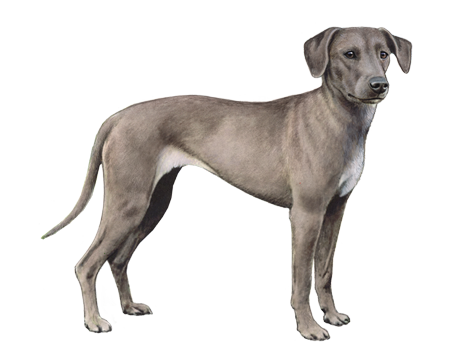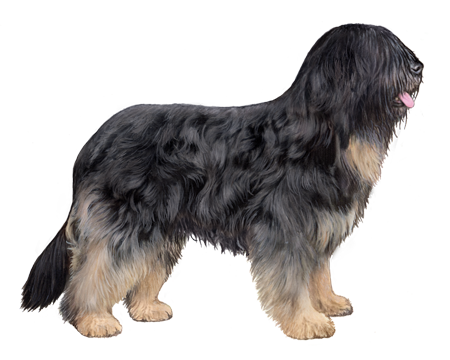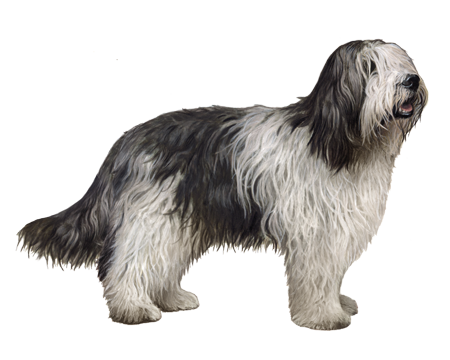
Pyrenean Mastiff
Pyrenean Mastiffs are certainly gentle giants. The guardian breed is known for its gentle, calm, good-natured demeanor and outsized love for its family.
Interested in discovering if your dog is a Pyrenean Mastiff?
Check out Wisdom Panel's DNA tests.

Pyrenean Mastiff Traits
General Appearance
Pyrenean Mastiffs are large dogs of above-average size, muscular builds, and firm bone structures. Despite their large, strong bodies, they never look heavy or sluggish.
Coat and Coloring
Pyrenean Mastiffs have dense, thick, medium-length hair that is longer on their shoulders, necks, underbellies, back of legs, and tails.
Their coats are bristly, not woolly in texture; the plumes of hair on their tails have a less bristly texture than the rest of their bodies.
The primary color of the Pyrenean Mastiffs is white. These dogs have well-defined masks and may have irregularly distributed, distinctly outlined patches on their bodies that are the same color as their masks.
The most desired shade of the base coat is white, while the most desired shades of patches are medium gray, intense golden yellow, brown, black, grey-silver, light beige, sandy, or marble. Their ears are always spotted; the tips of their tails and lower parts of their legs are always white.
Distinctive Physical Traits
Pyrenean Mastiffs have powerful, robust, rectangular bodies with muscular backs, broad, deep chests, and pronounced withers. Their strong, flexible tails are set medium-high and are thick at the root with soft hair that forms a plume.
Pyrenean Mastiffs also have medium-sized, triangular-shaped ears that hang flat and small, almond-shaped eyes that convey an alert, noble, and intelligent expression but can be stern toward an opponent.
Pyrenean Mastiff Temperament
Pyrenean Mastiffs are natural guardians that will never back down from a challenge.
In their homes, these great protectors are friendly, calm, and even-tempered; they are welcoming to friends and family, love children, and only show their protective instincts when there is truly a threat. Pyrenean Mastiffs do bark—a loud, deep rumble—to warn off danger but are mostly calm and laid back.
Their natural guardian tendencies extend toward other animals, making these dogs great companions for other pets.
Like other mastiffs, Pyrenean Mastiffs drool profusely. The soggy mess is a small price to pay for their love, loyalty, and protection.


Pyrenean Mastiff History
The Pyrenean Mastiff's origins are relatively unknown, though experts believe the breed descends from molosser dogs that arrived in the Pyrenees Mountains 3,000 years ago. Each isolated mountain region developed a unique livestock guardian breed from the molosser dogs, including the Pyrenean Mastiff, Spanish Mastiff, and Great Pyrenees.
During the migration of flocks to and from grazing grounds in the Aragon region of Spain in 504 A.D., shepherds traveled with a small pack of Pyrenean Mastiffs. The herds had more than a thousand sheep, which the dogs expertly protected from bears and wolves in the mountains and foothills.
Though the dogs excelled as flock guardians for centuries, their numbers plummeted in the mid-20th century as the Spanish Civil War and World War II led to decreased reliance on guardian dogs. When a pack of wolves returned to the Aragon region in the 1970s, shepherds reintroduced guardian dogs to the mountains.
Breed enthusiasts have also worked hard to restore Pyrenean Mastiff populations from 30 prime Pyrenean Mastiff specimens. The breed is still rare but has rebounded to more than 4,000 dogs around the world.
Pyrenean Mastiff Care
Nutrition
Offer Pyrenean Mastiffs a high-quality dog food that is appropriate for their life stage (puppy, adult, senior) and consider a diet formulated for large breed dogs. Portion out their food with a measuring cup and limit treats to 10 percent of their daily calories to prevent overfeeding.
Grooming
Brush Pyrenean Mastiffs every few days to prevent mats and tangles and reduce shedding. These dogs will need daily brushing during semi-annual “shedding seasons.” A de-shedding tool can help remove their undercoats in the spring and fall.
Pyrenean Mastiffs also need regular nail trims, ear cleanings, and a dental care routine, including at-home tooth brushing and professional dental cleanings.
Exercise
Historically, Pyrenean Mastiffs conserved their energy to fight off predators and spent most of their time watching out for their flocks. Because of this, the breed does not require a ton of exercise.
Regular walks or playtime in a fenced backyard are sufficient to keep them healthy and happy.
Training
Pyrenean Mastiffs are alert and intelligent. To help them master basic commands, keep training sessions short and upbeat, and use motivational tools such as positive reinforcement and rewards. These dogs love spending time with their owners and will see training as a time to bond.
Early socialization is important, too. Start introducing Pyrenean Mastiffs to new people, pets, and places when they are puppies to help them grow into well-mannered adults.

Breed Group
Herding
The herding group is a diverse category. These highly intelligent breeds were developed to guard and control the movement of livestock.
Resources
https://www.akc.org/dog-breeds/pyrenean-mastiff/
http://www.fci.be/Nomenclature/Standards/092g02-en.pdf
Reviewed July 26, 2020 by Laura Inman, DVM























































